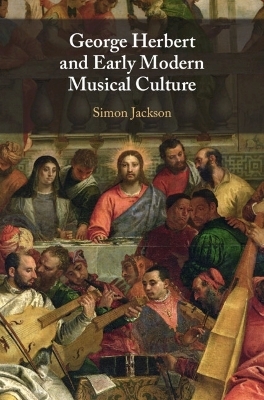
George Herbert and Early Modern Musical Culture
Seiten
2022
Cambridge University Press (Verlag)
978-1-009-09806-9 (ISBN)
Cambridge University Press (Verlag)
978-1-009-09806-9 (ISBN)
The first full-length study to fully situate Herbert's verse in the early modern culture from which it emerged, this interdisciplinary book argues for an innovative 'musical' mode of reading lyric that will prove illuminating for students and scholars working in early modern literary studies and in seventeenth-century music and theology.
Described by one contemporary as the 'sweet singer of The Temple', George Herbert has long been recognised as a lover of music. Nevertheless, Herbert's own participation in seventeenth-century musical culture has yet to be examined in detail. This is the first extended critical study to situate Herbert's roles as priest, poet and musician in the context of the musico-poetic activities of members of his extended family, from the song culture surrounding William Herbert and Mary Sidney to the philosophy of his eldest brother Edward Herbert of Cherbury. It examines the secular visual music of the Stuart court masque as well as the sacred songs of the church. Arguing that Herbert's reading of Augustine helped to shape his musical thought, it explores the tension between the abstract ideal of music and its practical performance to articulate the distinctive theological insights Herbert derived from the musical culture of his time.
Described by one contemporary as the 'sweet singer of The Temple', George Herbert has long been recognised as a lover of music. Nevertheless, Herbert's own participation in seventeenth-century musical culture has yet to be examined in detail. This is the first extended critical study to situate Herbert's roles as priest, poet and musician in the context of the musico-poetic activities of members of his extended family, from the song culture surrounding William Herbert and Mary Sidney to the philosophy of his eldest brother Edward Herbert of Cherbury. It examines the secular visual music of the Stuart court masque as well as the sacred songs of the church. Arguing that Herbert's reading of Augustine helped to shape his musical thought, it explores the tension between the abstract ideal of music and its practical performance to articulate the distinctive theological insights Herbert derived from the musical culture of his time.
Simon Jackson is Director of Music at Peterhouse and Little St Mary's Church, Cambridge, and a former Leverhulme Early Career Fellow at the University of Warwick. His work focuses primarily on seventeenth-century musico-poetics, and has won the George Herbert Society Chauncey Wood Award (2013) and an English Literary Renaissance Award (2015).
1. Measuring Well: Ethics and Incarnational Music; 2. Communities of voices: Song culture at Wilton House; 3. The visual music of the masque; 4. Concord and consent: The music of Lord Herbert of Cherbury; 5. Double motion: Attending to church music; 6. Singing the Psalms.
| Erscheinungsdatum | 01.12.2022 |
|---|---|
| Zusatzinfo | Worked examples or Exercises |
| Verlagsort | Cambridge |
| Sprache | englisch |
| Maße | 157 x 235 mm |
| Gewicht | 580 g |
| Themenwelt | Literatur ► Lyrik / Dramatik ► Lyrik / Gedichte |
| Kunst / Musik / Theater ► Musik | |
| Geisteswissenschaften ► Sprach- / Literaturwissenschaft ► Anglistik / Amerikanistik | |
| Geisteswissenschaften ► Sprach- / Literaturwissenschaft ► Literaturgeschichte | |
| Geisteswissenschaften ► Sprach- / Literaturwissenschaft ► Literaturwissenschaft | |
| ISBN-10 | 1-009-09806-3 / 1009098063 |
| ISBN-13 | 978-1-009-09806-9 / 9781009098069 |
| Zustand | Neuware |
| Informationen gemäß Produktsicherheitsverordnung (GPSR) | |
| Haben Sie eine Frage zum Produkt? |
Mehr entdecken
aus dem Bereich
aus dem Bereich
Deutsche Gedichte aus zwölf Jahrhunderten
Buch | Hardcover (2023)
C.H.Beck (Verlag)
CHF 41,90
Text, Übersetzung, Melodien, Kommentar
Buch | Softcover (2024)
De Gruyter (Verlag)
CHF 34,90


